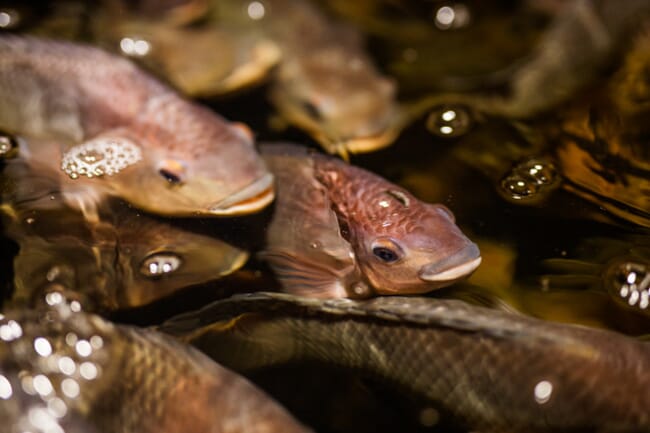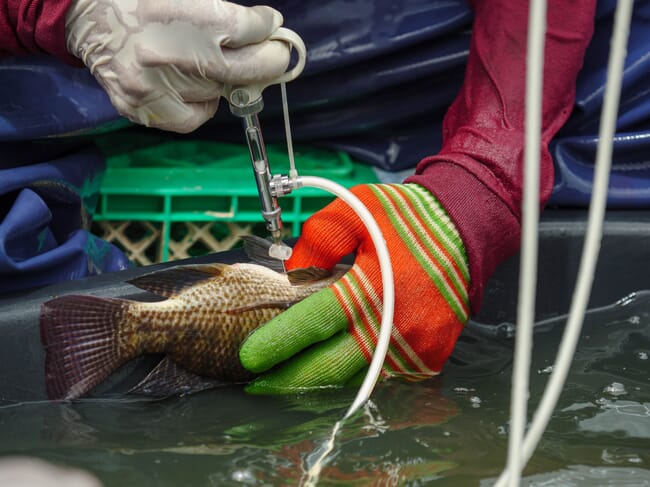
Tilapia lake virus is a huge challenge for the global tilapia industry, causing severe infections, stunning high mortality rates and economic losses for tilapia farmers. The virus can also be transmitted vertically – from infected parents to their uninfected offspring.
Vaccination is emerging as a potential strategy to keep TiLV and other infectious aquaculture diseases in check. Several vaccine candidates are being explored as a potential way to control the virus by making tilapia immune to infection.
Active and passive immunity in tilapia
Vaccines work by stimulating the passive and active immune system in fish. Passive immunity refers to the transfer of antibodies from one individual to another to provide protection against an infectious agent. In fish, this type of immunity can be acquired through the transfer of protective antibodies from vaccinated broodstock to their offspring.
The transfer of maternal antibodies through broodstock vaccination has been observed in multiple fish species. Researchers concluded that it can reduce the risk of vertical transmission of diseases and increase larval survival.

Protecting the broodstock
Researchers from the Center of Excellence in Fish Infectious Diseases (CE FID) of Chulalongkorn University, the Biotechnology Center of Ho Chi Minh City, Kasetsart University, Mahidol University, and other organisations, hypothesised that Nile tilapia broodstock (Oreochromis niloticus) immunised with an inactivated TiLV vaccine can mount a protective antibody response and passively transfer maternal antibodies to their eggs and larvae.
To test the hypothesis, the researchers worked with three groups of tilapia breeders, with a heat-inactivated TiLV vaccine (HKV), a formalin-inactivated TiLV vaccine (FKV). Booster vaccination with the vaccines was given three weeks later and mating took place one week later. The researchers collected blood sera from broodstock, fertilised eggs, and larvae 6 to 14 weeks after vaccination to measure TiLV-specific antibody (anti-TiLV IgM) levels.
Vaccinating the mothers and protecting the eggs
According to the researchers, the study provided evidence that maternal antibodies from tilapia broodstock vaccinated with TiLV are transferred to their offspring.
"The results showed that anti-TiLV IgM was produced in the majority of male and female broodstock vaccinated with HKV or FKV, and that these antibodies could be detected in fertilised eggs and larvae of vaccinated broodstock," they said.
They also note that higher levels of maternal antibodies were observed in fertilised eggs from HKV-vaccinated breeders than in those vaccinated with FKV.
“Low levels of TiLV-IgM were detected in some of the one- to three-day-old larvae, but were undetectable in seven- to fourteen-day-old larvae from vaccinated broodstock, indicating a brief persistence of TiLV-IgM in the larvae.” , stand out.
They also report that passive immunisation demonstrated that antibodies elicited by TiLV vaccines could confer 85 percent to 90 percent protection with TiLV challenge in juvenile tilapia.
In addition to vaccination, the researchers stress that biosecurity measures remain essential to prevent the introduction of pathogens into tilapia hatcheries, especially during seed production.
"Immunisation of tilapia broodstock with TiLV vaccines could be a potential strategy for the prevention of TiLV in fertilised eggs and tilapia larvae, with the HKV vaccine being the most promising for maternal vaccination," the researchers conclude.
They also note that the protective antibodies had a short persistence in the larvae leaving a gap between maternal immunity and immunocompetence.
The researchers indicate that further vaccination is likely to be needed to protect fish from TiLV infection during the larval period, as well as in later stages of development.




